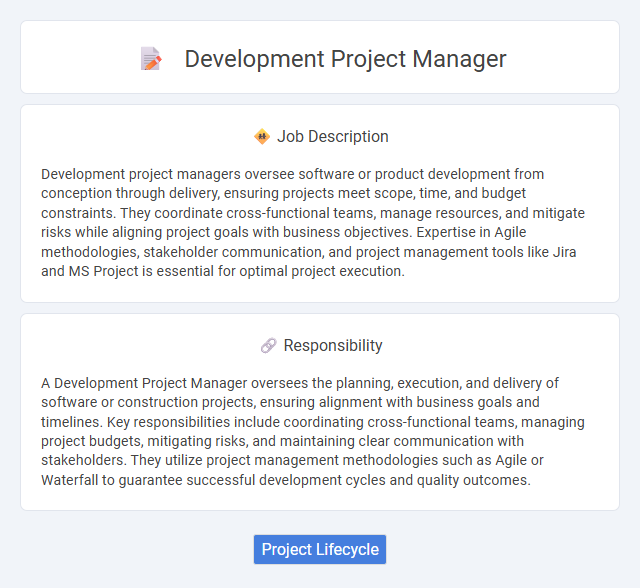
Development project managers oversee software or product development from conception through delivery, ensuring projects meet scope, time, and budget constraints. They coordinate cross-functional teams, manage resources, and mitigate risks while aligning project goals with business objectives. Expertise in Agile methodologies, stakeholder communication, and project management tools like Jira and MS Project is essential for optimal project execution.
Candidates with strong organizational skills and the ability to manage complex projects under pressure are likely to excel as development project managers. Those who prefer collaborative environments and possess effective communication abilities may find this role particularly suitable. Individuals who struggle with multitasking or adapting to fast-paced changes might face challenges thriving in this dynamic position.
Qualification
A Development Project Manager typically requires a bachelor's degree in computer science, engineering, or related fields, with certifications such as PMP or Agile Scrum Master enhancing qualifications. Proven experience in software development lifecycle management, resource allocation, and risk mitigation is critical for success. Strong leadership, communication skills, and proficiency with project management tools like Jira or Microsoft Project are essential to efficiently drive projects from initiation to completion.
Responsibility
A Development Project Manager oversees the planning, execution, and delivery of software or construction projects, ensuring alignment with business goals and timelines. Key responsibilities include coordinating cross-functional teams, managing project budgets, mitigating risks, and maintaining clear communication with stakeholders. They utilize project management methodologies such as Agile or Waterfall to guarantee successful development cycles and quality outcomes.
Benefit
A Development Project Manager likely enhances team productivity and streamlines project timelines through effective resource allocation and risk management. They are expected to improve communication between stakeholders, increasing overall project transparency and reducing delays. Their leadership may result in higher-quality deliverables and optimized budget usage, benefiting the organization's growth and success.
Challenge
Development project managers likely face the challenge of balancing competing priorities such as time, budget, and quality while ensuring project milestones are met. Navigating ambiguity and managing stakeholder expectations often demand strong problem-solving skills and adaptability. There is a high probability that unforeseen technical issues or resource constraints will require quick decision-making and proactive risk management.
Career Advancement
A Development Project Manager plays a critical role in overseeing software and product development lifecycle, ensuring projects are delivered on time and within budget. Mastering agile methodologies, stakeholder communication, and technical team leadership significantly enhances opportunities for career advancement into senior management or program director roles. Pursuing certifications such as PMP or Scrum Master and gaining cross-functional experience accelerates professional growth and increases earning potential.
Key Terms
Project Lifecycle
A Development Project Manager oversees the entire project lifecycle from initiation and planning through execution, monitoring, and closure, ensuring timely delivery and alignment with business objectives. They coordinate cross-functional teams, manage resources, and implement risk mitigation strategies to maintain project scope, budget, and quality standards. Proficient use of project management tools like Agile, Scrum, or Waterfall methodologies facilitates transparent communication and efficient progress tracking throughout all stages of development.
 kuljobs.com
kuljobs.com